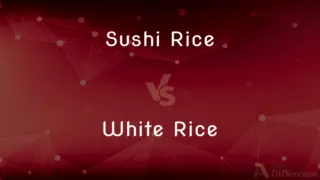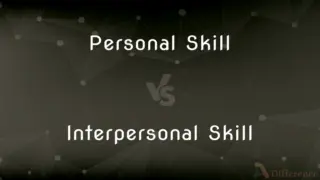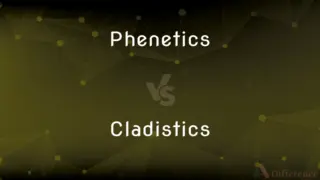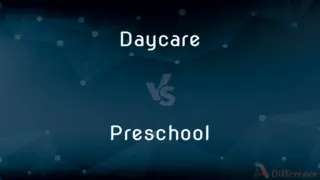Idiocracy vs. Idiosyncrasy — What's the Difference?
By Tayyaba Rehman & Fiza Rafique — Updated on May 6, 2024
Idiocracy refers to a government or society governed by individuals perceived as incompetent, while idiosyncrasy pertains to a distinctive or peculiar trait or characteristic of an individual or group.

Difference Between Idiocracy and Idiosyncrasy
Table of Contents
ADVERTISEMENT
Key Differences
Idiocracy is a term popularly used to describe a government or society where leadership is in the hands of the least competent individuals, emphasizing systemic failure. Whereas idiosyncrasy refers to an individual’s unique behavior, thought, or mannerism that distinguishes them from others.
In the concept of idiocracy, the focus is on the collective intelligence of leaders and their impact on societal efficiency and progress, often highlighted in satirical contexts. On the other hand, idiosyncrasy is generally neutral or positive, emphasizing personal uniqueness without systemic implications.
Idiocracy often carries a negative connotation, suggesting a decline in societal standards and governance. Whereas idiosyncrasy, while it can be viewed as quirky or unusual, does not imply any judgment on capability or governance.
The term idiocracy can be used both seriously and humorously to critique political entities or social trends that seem to favor or elevate incompetence. In contrast, idiosyncrasy is usually employed in a descriptive, often affectionate way to discuss individual traits.
While idiocracy is a concept applied to groups or large entities (like governments or societies), idiosyncrasy is almost exclusively used to describe individuals or small groups, focusing on personal characteristics rather than collective attributes.
ADVERTISEMENT
Comparison Chart
Definition
Rule by the least competent
A distinctive or peculiar trait
Usage Context
Government, societal critique
Individual behavior or characteristics
Connotation
Negative, critical
Neutral, distinctive
Scope
Collective (societal or governmental)
Individual
Implications
Decline in effective governance
Personal uniqueness, no broader societal impact
Compare with Definitions
Idiocracy
A form of government where power resides with the least capable or intelligent members.
The movie 'Idiocracy' portrays a future where society has dumbed down after generations of anti-intellectualism.
Idiosyncrasy
A mode of behavior or way of thought peculiar to an individual.
One of his idiosyncrasies is wearing two different socks.
Idiocracy
A pejorative term used to describe a poorly functioning social system.
The inefficiency of the new regulations led many to decry it as the hallmark of an emerging idiocracy.
Idiosyncrasy
A distinctive or peculiar feature or characteristic.
Her writing style has several idiosyncrasies that make her work unique.
Idiocracy
A hypothetical political system characterized by incompetence and mediocrity.
The novel presents an idiocracy where decisions are made by random lottery rather than expertise.
Idiosyncrasy
A characteristic, habit, or pattern of behavior or thought that is peculiar to an individual.
She has the idiosyncrasy of ending every email with a quote from a classic novel.
Idiocracy
A state or society governed by the least qualified individuals.
Critics argue that the new policies are evidence the government is turning into an idiocracy.
Idiosyncrasy
Personal mannerisms or quirks that are unique to an individual.
His idiosyncrasy of always shaking the pen before writing is quite noticeable.
Idiocracy
The rule or dominance of stupidity in societal governance.
Many satirical cartoons depict the current administration as an idiocracy.
Idiosyncrasy
An unusual feature that distinguishes a person from others.
One idiosyncrasy of his teaching method is starting every class with a silent meditation.
Idiocracy
Idiocracy is a 2006 American dystopian science fiction comedy film directed by Mike Judge and co-written by Judge and Etan Cohen. Starring Luke Wilson, Maya Rudolph, and Dax Shepard, it follows an American soldier who takes part in a classified hibernation experiment, only to be accidentally frozen for too long and awaken 500 years later in a dystopian world where dysgenics and commercialism have run rampant, mankind has embraced anti-intellectualism, and society is devoid of such traits as intellectual curiosity, social responsibility, justice, and human rights.
Idiosyncrasy
An idiosyncrasy is an unusual feature of a person (though there are also other uses, see below). It can also mean an odd habit.
Idiocracy
A government run by idiots.
Idiosyncrasy
A mode of behaviour or way of thought peculiar to an individual
One of his little idiosyncrasies was always preferring to be in the car first
Idiocracy
A society where idiocy is the norm, often denoting the current state of the world.
Idiosyncrasy
An abnormal physical reaction by an individual to a food or drug.
Idiosyncrasy
A structural or behavioral characteristic peculiar to an individual or group.
Idiosyncrasy
A physiological or temperamental peculiarity.
Idiosyncrasy
An unusual individual reaction to food or a drug.
Idiosyncrasy
A behavior or way of thinking that is characteristic of a person.
Idiosyncrasy
A language or behaviour that is particular to an individual or group.
Idiosyncrasy
(medicine) A peculiar individual reaction to a generally innocuous substance or factor.
Idiosyncrasy
A peculiarity that serves to distinguish or identify.
He mastered the idiosyncrasies of English spelling and speech.
Idiosyncrasy
A peculiarity of physical or mental constitution or temperament; a characteristic belonging to, and distinguishing, an individual; characteristic susceptibility; idiocrasy; eccentricity.
The individual mind . . . takes its tone from the idiosyncrasies of the body.
Idiosyncrasy
A behavioral attribute that is distinctive and peculiar to an individual
Common Curiosities
Can idiosyncrasy have a negative impact?
While typically neutral or endearing, idiosyncrasies can sometimes be seen as odd or annoying in certain social contexts.
Do idiosyncrasies affect a person’s professional performance?
Idiosyncrasies generally do not impact professional capabilities and are seen as part of individual distinctiveness.
Is idiocracy a recognized form of government?
Idiocracy is not a formal type of government but is used as a critical or satirical term to describe perceived governmental incompetence.
How does idiocracy manifest in society?
It is often depicted in media and discussions as a decline in intelligent discourse and decision-making, leading to ineffective governance.
Why are idiosyncrasies important in character development in literature?
Idiosyncrasies can make characters more relatable, memorable, and realistic, adding depth to storytelling.
Can idiocracy be reversed in a society?
Addressing idiocracy typically involves educational reforms, cultural shifts, and promoting competent leadership.
How can idiosyncrasies contribute to a person’s identity?
Idiosyncrasies help form a part of one’s unique identity, often endearing them to others or marking them as distinctive.
What is the main difference between idiocracy and idiosyncrasy?
Idiocracy describes a societal or governmental state characterized by incompetent leadership, whereas idiosyncrasy refers to unique personal traits or behaviors.
How can one identify idiosyncrasies in others?
Observing consistent personal habits or unusual behaviors that stand out can indicate someone’s idiosyncrasies.
How do cultural differences affect perceptions of idiosyncrasies?
Cultural contexts can influence whether certain behaviors are seen as charming or strange.
What is the role of education in preventing an idiocracy?
Education plays a crucial role by fostering critical thinking, knowledge, and competent civic engagement.
What historical examples exist of idiocracy?
Some critics cite late Roman emperors or certain decadent periods in history as examples of idiocracy.
Is idiocracy always used humorously?
While often used in humor, idiocracy can also be a serious critique of systemic failures in governance or leadership.
Can a person’s idiosyncrasies change over time?
Yes, personal traits and behaviors can evolve due to new experiences, environments, or personal growth.
Is there any positive aspect to idiocracy?
In literature and media, idiocracy can serve as a satirical tool to provoke thought and encourage reflection on societal values and leadership.
Share Your Discovery

Previous Comparison
Drifter vs. Grifter
Next Comparison
Colleague vs. StudentAuthor Spotlight
Written by
Tayyaba RehmanTayyaba Rehman is a distinguished writer, currently serving as a primary contributor to askdifference.com. As a researcher in semantics and etymology, Tayyaba's passion for the complexity of languages and their distinctions has found a perfect home on the platform. Tayyaba delves into the intricacies of language, distinguishing between commonly confused words and phrases, thereby providing clarity for readers worldwide.
Co-written by
Fiza RafiqueFiza Rafique is a skilled content writer at AskDifference.com, where she meticulously refines and enhances written pieces. Drawing from her vast editorial expertise, Fiza ensures clarity, accuracy, and precision in every article. Passionate about language, she continually seeks to elevate the quality of content for readers worldwide.















































